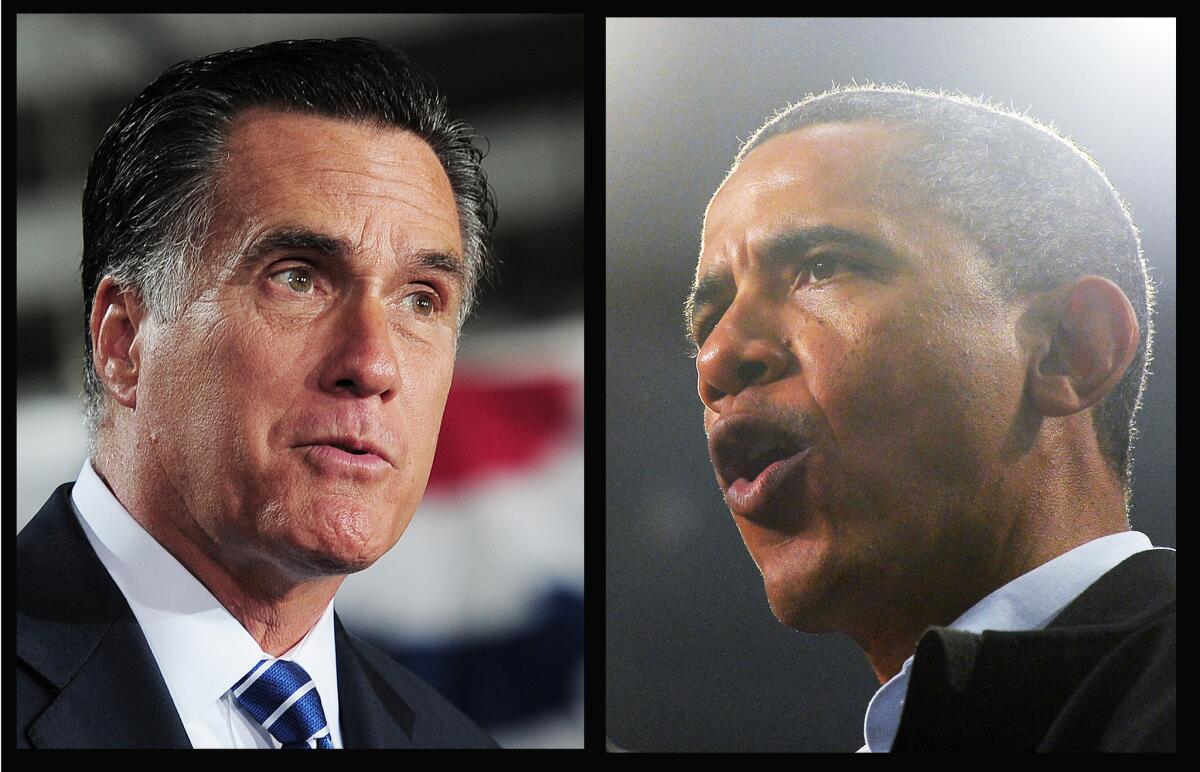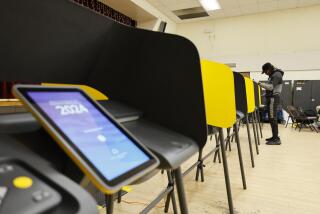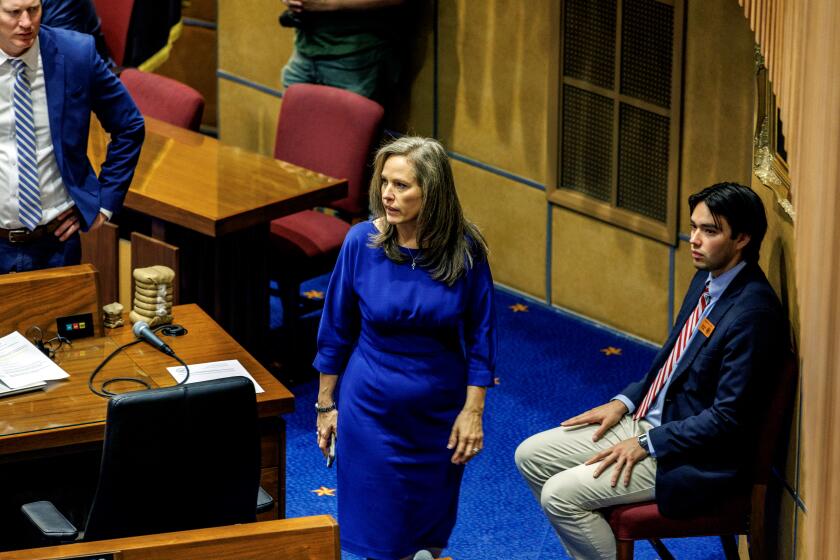Three reasons Obama will win; three reasons Romney will win

The most expensive election in U.S. history is almost over, and most public polls suggest President Obama has a small, but persistent, edge over his Republican challenger, Mitt Romney.
But before the final vote counts, here are three reasons each candidate has to expect victory, and a key place to watch to see who is right.
Reasons Obama will win
Economic optimism: Yes, unemployment remains high at 7.9%, and the recovery has been slow. But slow growth and no growth sit worlds apart. Incumbent presidents presiding over a growing economy with rising job numbers in the election year almost always prevail. Moreover, ever since the summer, the number of Americans expressing optimism about the economy’s future has grown. That shift shows up in pre-election polls as well as in rising consumer confidence.
Photos: America goes to the polls
Increased optimism has provided crucial lift for Obama — he wins overwhelmingly among voters who say the economy will be better next year — and it could be particularly important in key Midwestern contests, including Wisconsin and Ohio.
Latinos: For at least a decade, Karl Rove and other Republican strategists have warned that the party risked failure if it could not find a way to reach out to the country’s fast-growing Latino population. Instead of doing so this year, Mitt Romney ran a primary campaign that stressed hard-line positions against illegal immigration. The goal was to outflank Texas Gov. Rick Perry, and it succeeded, but at high cost. (And ultimately, Perry did so poorly that he might have lost anyway.)
Polls of Latino voters show that Obama probably will get 70% or more of their vote. Already, early vote statistics indicate that strong support from Latinos has given Obama a big lead in Nevada. Depending on the size of the Latino turnout, he could add Colorado and Florida to his column.
Ground game: From strategists David Axelrod and David Plouffe and campaign manager Jim Messina on down, Obama campaign officials have said for more than a year that the organization they were building to identify, register, mobilize and turn out supporters would provide the difference in a close election. So far, in the early voting, that organization has largely performed as advertised.
Even in North Carolina, where most polls have pointed to a Romney victory, Democrats have a slightly larger edge in the early vote than they had in 2008, when Obama won the state by the slenderest of margins. In Ohio and Florida, long lines, mostly of Obama supporters, circled early voting locations over the weekend and Monday. The campaign has benefited from new techniques in identifying and targeting supporters and motivating them to show up at the polls. And although Republicans also have proved they can turn out their supporters — they showed that this spring in Wisconsin’s recall election, for example — the Democrats appear to have an edge.
Reasons Romney will win
Economic performance: Yes, optimism is on the rise, but there’s no denying that a majority of Americans believes the country is headed in the wrong direction and doesn’t have confidence that Obama’s economic policies will fix it. With the economy as the issue that the great majority of voters consider their top priority, Republicans have argued that wavering voters in the end will come down on the challenger’s side. The most recent Pew Research Center survey showed Obama with a slight edge, but also showed that the number of voters who said they might yet change their minds was enough to switch the outcome.
Understating the GOP vote: Among Republican pollsters, several believe that the public polls conducted by news organizations, universities and research centers like Pew have all understated the Republican vote. The arguments for that position vary. A chief one is that the methods pollsters use to identify likely voters have overstated the partisan gap between Democrats and Republicans.
In the 2004 election, exit polls showed the number of voters identifying with each party was roughly equal. In 2008, Democrats had a substantial edge. Most, though not all, public polls look more like 2008 than 2004, with more self-identified Democrats than Republicans. The Republicans who doubt those polls say the Democratic edge in 2008 was a one-time thing, brought on by Obama’s popularity that year. This year’s party identification should look more like 2004, they argue. Nonpartisan pollsters dispute that argument, but if it’s correct, Romney almost certainly will do better than the polls have indicated.
A smaller, older and whiter electorate: In 2008, 61.6% of the population potentially eligible to register and vote actually cast ballots. That was the highest level since before 1971, when the 26th Amendment to the Constitution gave 18-year-olds the right to vote. Most analysts expect this year’s turnout percentage to be lower. But how much? And which voters will stay home?
Professor Michael McDonald of George Mason University, the leading expert on voter turnout, estimates that 60% to 61% of the voter-eligible population will turn out. That would put the 2012 turnout level slightly lower than that of 2008, but likely higher than 2004’s 60.1%.
Some Republicans expect a bigger decline. They believe turnout of younger voters will drop significantly from 2008 levels and that minority turnout also will decline because of what they see as lowered enthusiasm for Obama. Turnout of older, white voters will rise because of greater intensity on the GOP side, they predict. The result would be an electorate that is both older and whiter than the one in 2008, which was 74% non-Latino whites, according to exit polls.
In 2004, when Bush won reelection, non-Latino whites made up 77% of the electorate, and in the 2010 midterm elections, when Republicans regained control of the House, the white share was 78%. Many Democratic strategists expect the white share of the electorate to fall to 73% this year, but some Republicans expect the white share to rise, which would give Romney an edge in key states because of the sharp racial polarization of the vote.
INTERACTIVE MAP: Electoral votes and battleground states
Early clues to which side is right?
Look for the returns from Virginia, which has among the earliest poll-closing times in the country: 7 p.m. Eastern time. Minority turnout, economic optimism and the strength of Obama’s ground game all will be in play there. If the results come in strongly for one candidate or the other, it could set the pattern for the night.
Follow Politics Now on Twitter and Facebookdavid.lauter@latimes.com
Twitter: @DavidLauter
More to Read
Get the L.A. Times Politics newsletter
Deeply reported insights into legislation, politics and policy from Sacramento, Washington and beyond. In your inbox three times per week.
You may occasionally receive promotional content from the Los Angeles Times.







